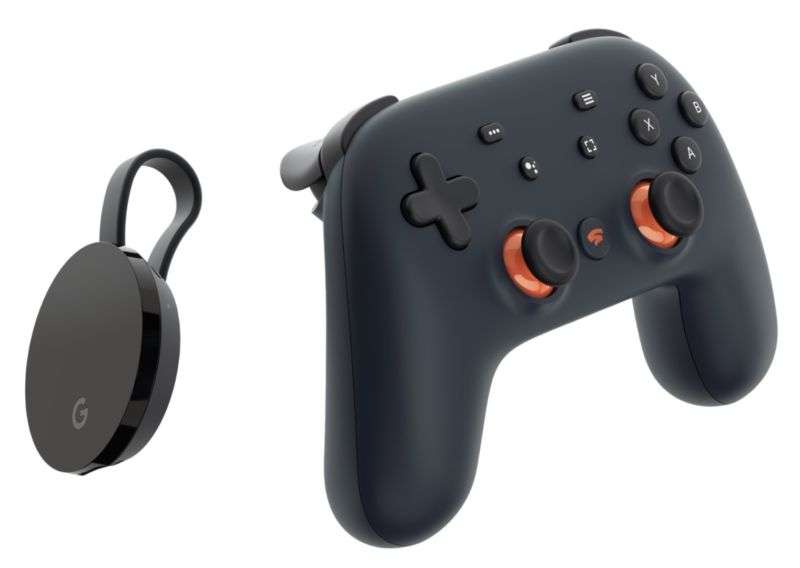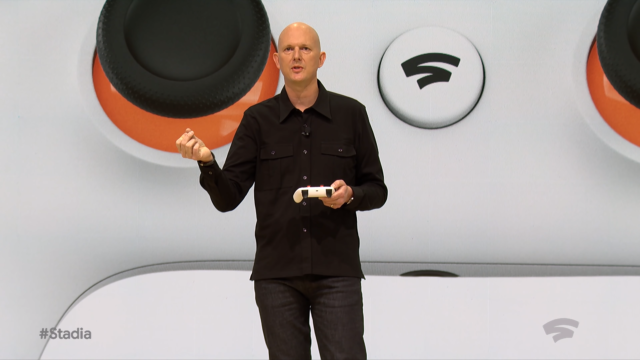
Google Stadia exec isn’t worried about data caps—but he probably should be

The Google executive in charge of the company’s new Stadia game-streaming service says he thinks data caps won’t be a problem—but his prediction largely depends on the generosity of ISPs.
In an interview Friday with GameSpot, Google VP Phil Harrison said his confidence stems from US broadband providers’ history of treating their customers well.
As he told GameSpot:
The ISPs have a strong history of staying ahead of consumer trends and if you look at the history of data caps in those small number of markets—and it’s actually a relatively small number of markets that have [data caps]—the trend over time, when music streaming and download became popular, especially in the early days when it was not necessarily legitimate, data caps moved up. Then with the evolution of TV and film streaming, data caps moved up, and we expect that will continue to be the case.
When GameSpot’s interviewer asked if ISPs can really be relied upon to raise data caps to accommodate game streaming, Harrison didn’t change his position.
“ISPs are smart [and] they understand that they’re in the business of keeping customers happy and keeping customers with them for a long time,” Harrison said.
Stadia is scheduled for release in November. Google says you’ll need 35Mbps to play at the maximum settings of 4K resolution, high dynamic range (HDR), and 60 frames per second (fps) with 5.1 surround sound. As we previously noted, that amounts to 15.75GB per hour, which would use up an entire 1TB monthly data allotment in 65 hours of game time.
Google has said it will offer “a tool to help gamers monitor and manage data usage,” likely meaning that customers can reduce video settings to use less data. And Harrison told GameSpot that 4K gaming won’t constantly need 35Mbps “because we use compression.” But Stadia could end up using significantly more data than 4K video streaming, which generally requires about 15Mbps.
Data caps have risen, but are widespread
Harrison could point to some history to make his case that ISPs will raise caps in response to game streaming. Comcast raised its monthly data cap from 300GB to 1TB in 2016, a much-needed improvement because Comcast charges data overage fees of $10 for each additional block of 50GB. Today 1TB a month has taken hold as the default cap for numerous ISPs.
On a long enough timeline, it’d be surprising if ISPs never raised data caps again. Harrison is also right that major ISPs don’t impose data caps in many parts of the US.
But there are also reasons to think Harrison’s prediction is too optimistic, especially in parts of the US where there’s little to no broadband competition.
Harrison’s statement that “ISPs have a strong history of staying ahead of consumer trends” is hard to square with the fact that broadband and pay-TV providers have repeatedly been rated as the least customer-friendly industries in the US by the American Customer Satisfaction Index.
ISPs’ use of arbitrary data caps and long history of nickel and diming customers with fees that raise actual prices over advertised rates have played no small role in the industry’s awful reputation with customers. While Harrison said that data caps are imposed in a “relatively small number of markets,” Comcast imposes caps and charges overage fees in parts of 27 of the 39 states it offers Internet service in. Comcast’s caps would likely be even more widespread if not for the competition Comcast faces from Verizon’s uncapped FiOS service in the Northeast.
AT&T, the nation’s biggest non-cable home Internet provider, imposes data caps ranging from 150GB to 1TB a month.
Charter, the second-largest cable company after Comcast, doesn’t impose caps. But that may be largely because Charter is prohibited from selling plans with data caps and overage fees until 2023 thanks to merger conditions imposed on its 2016 purchase of Time Warner Cable. After the merger conditions expire, Charter will be free to impose caps in order to collect more money from customers.
No more FCC oversight
The repeal of net neutrality rules by the Ajit Pai-led Federal Communications Commission also doesn’t bode well for customers on the data-cap front.
Net neutrality rules were still in place when Comcast raised its cap from 300GB to 1TB in 2016. The net neutrality rules didn’t prohibit data caps, but they did give the FCC power to stop the worst practices associated with the caps. The Obama-era FCC ruled that AT&T and Verizon Wireless violated net neutrality rules by exempting their own video services from mobile data caps while charging other online services for the same data cap exemptions (aka “zero-rating”).
But Pai’s FCC almost immediately rescinded this ruling, and later it eliminated the rules entirely, making it clear that the FCC would impose no restrictions on data caps or zero-rating.
With the rules having been repealed, there is now less government pressure on ISPs to be reasonable with their data caps. Pai’s FCC even eliminated rules that forced ISPs to be more transparent with customers about hidden fees and the consequences of exceeding data caps.
The value of zero-rating to ISPs depends on keeping caps low enough that consumers might go over them, and ISPs could use zero-rating to extract fees from other companies or to limit the spread of third-party game streaming. That’s something to watch out for, especially if ISPs start offering their own game-streaming services.
ISPs haven’t fully taken advantage of the net neutrality repeal, perhaps because they want to avoid bad press while Democratic lawmakers push for the restoration of the rules and while the FCC repeal is being challenged in court. But they have taken advantage of the FCC blessing all forms of data caps and zero-rating.
ISPs can already offer their own streaming video services and use data caps to steer customers away from rival services. AT&T, for example, waives its home Internet data cap if you subscribe to its DirecTV Now online-video service—but AT&T’s data cap and overage charges still apply if you use Netflix or other non-AT&T video services.
The same thing could happen in game streaming. If an ISP offers its own game-streaming service, it could exempt its own service from its data cap while applying the data cap to Google Stadia and other third-party systems. ISPs could also ask Google to pay for data cap exemptions.
In short, ISPs have clear incentive and legal ability to keep imposing data caps at the current level and to expand the use of zero-rating to hinder competition. This is especially true in parts of the country where ISPs effectively have regional monopolies, with only one ISP providing modern speeds in each city or town.
Data caps are designed for profit, not for managing congestion—as a Comcast technology executive once explained, the size of the monthly cap is a “business policy,” not a technical decision.
5G to the rescue?
When GameSpot pointed out to Harrison that ISPs might see game streaming “as an opportunity to attach further costs to having more data,” the Google executive said that the ongoing deployment of 5G might solve the problem. Harrison pointed out that Verizon is offering a 5G-based wireless home Internet service with speeds of 300Mbps to 1Gbps and no data caps.
“All of the 5G fixed wireless businesses that are up now that I’m aware of have no data caps and are very, very high performance, so that’s introducing a competitive dynamic,” Harrison said.
But Verizon’s 5G home Internet is in just four cities and its coverage in those cities is sparse. Just because Verizon’s service is cap-less also doesn’t mean other ISPs won’t cap 5G—Verizon’s lack of data caps for FiOS hasn’t caused Comcast and AT&T to stop capping their Internet services, after all.
On the mobile side, carriers could use 5G to raise costs for consumers. AT&T CEO Randall Stephenson recently said that 5G mobile service will likely be priced similarly to home Internet. With something like Google Stadia, that could mean wireless customers would have to pay carriers extra for speeds capable of running the game service at its highest quality, and such users would pay their carriers again when those high speeds help them exceed data caps.
This doesn’t mean that Internet users should avoid game-streaming services. If customers stream at 1080p instead of 4K, they can make their 1TB data cap go a lot further. But despite Harrison’s optimism that ISPs will do what it takes to keep customers happy, the industry’s history suggests that broadband providers will see game streaming an opportunity to squeeze more money out of Internet users.
Disclosure: The Advance/Newhouse Partnership, which owns 13 percent of Charter, is part of Advance Publications. Advance Publications owns Condé Nast, which owns Ars Technica.





